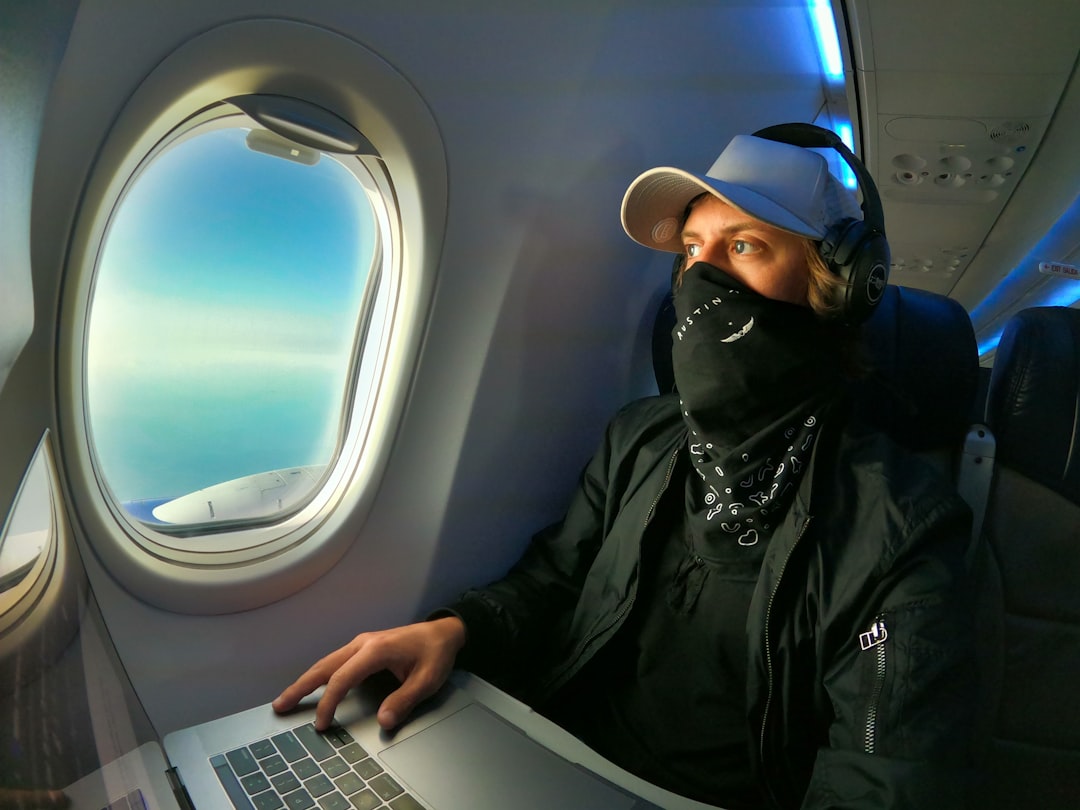Exploring the Rise of Digital Nomads Remote Work Opens New Travel Opportunities
Exploring the Rise of Digital Nomads Remote Work Opens New Travel Opportunities - The Digital Nomad Revolution - Redefining Work and Travel

The digital nomad revolution is redefining the very nature of work and travel.
With the rise of remote work, professionals are increasingly embracing the freedom and flexibility to work from diverse locations worldwide.
This trend has led to the emergence of supportive communities and resources, offering a sense of belonging for those embracing this lifestyle.
However, digital nomadism also presents challenges, such as managing financial affairs and navigating the complexities of working across borders.
Nonetheless, the benefits of this lifestyle, including enhanced work-life balance and cultural experiences, appear to outweigh the drawbacks for many individuals.
The average digital nomad spends over $2,000 per month on living expenses, stimulating local economies in their travel destinations and creating new business opportunities for accommodations, coworking spaces, and lifestyle services.
Prominent technology hubs like Tallinn, Estonia and Chiang Mai, Thailand have become digital nomad hotspots, with dedicated coworking spaces, networking events, and thriving entrepreneurial communities catering to this new class of mobile professionals.
The rise of digital nomadism has led to the emergence of innovative financial management tools and services, enabling seamless cross-border payments, automated tax compliance, and personalized insurance products tailored to the needs of location-independent workers.
What else is in this post?
- Exploring the Rise of Digital Nomads Remote Work Opens New Travel Opportunities - The Digital Nomad Revolution - Redefining Work and Travel
- Exploring the Rise of Digital Nomads Remote Work Opens New Travel Opportunities - Remote Work, Global Impact - How Digital Nomads Shape Tourism
- Exploring the Rise of Digital Nomads Remote Work Opens New Travel Opportunities - Networking on the Move - Building Communities for Wandering Professionals
- Exploring the Rise of Digital Nomads Remote Work Opens New Travel Opportunities - Work-Life Balance Redefined - Achieving Harmony as a Digital Nomad
- Exploring the Rise of Digital Nomads Remote Work Opens New Travel Opportunities - Tech-Savvy Travelers - Tools and Services Enabling the Nomadic Lifestyle
- Exploring the Rise of Digital Nomads Remote Work Opens New Travel Opportunities - Embracing Change - The Future of Work and Travel Intertwined
Exploring the Rise of Digital Nomads Remote Work Opens New Travel Opportunities - Remote Work, Global Impact - How Digital Nomads Shape Tourism
Digital nomads are reshaping the tourism industry through their travel habits and online presence.
Digital nomads' global connectivity and advocacy for lesser-known destinations are increasing cultural awareness and promoting a more diverse travel landscape.
According to recent surveys, digital nomads are a highly educated population, with over 80% holding a bachelor's degree or higher, reflecting their ability to leverage technology and remote work opportunities.
The average digital nomad spends around 18 to 22 hours per week on their primary work, leaving ample time for travel, exploration, and leisure activities, highlighting the work-life balance benefits of this lifestyle.
Digital nomads are not just confined to the tech industry; they come from diverse professional backgrounds, including marketing, consulting, writing, design, and even healthcare, showcasing the versatility of remote work.
Destinations with robust digital infrastructure, affordable cost of living, and vibrant social communities have emerged as hotspots for digital nomads, with cities like Ubud in Bali, Medellin in Colombia, and Chiang Mai in Thailand leading the way.
The rise of digital nomadism has led to the creation of new job roles, such as "remote work consultants" and "digital nomad coaches," who assist individuals in navigating the challenges and opportunities of this lifestyle.
The global impact of digital nomads is evident in their contribution to local economies, with an estimated 40% of their monthly expenses going towards accommodation, food, and entertainment, providing a significant boost to tourism-related industries.
Exploring the Rise of Digital Nomads Remote Work Opens New Travel Opportunities - Networking on the Move - Building Communities for Wandering Professionals

The rise of digital nomadism has led to the emergence of supportive communities and resources that cater to the needs of this mobile workforce.
These communities provide valuable networking opportunities, knowledge sharing, and a sense of belonging for digital nomads, who are actively developing and nurturing their professional networks through online platforms, coworking spaces, and industry associations.
As more professionals embrace the freedom and flexibility of remote work, the demand for specialized services and communities catering to the digital nomad lifestyle is expected to continue growing.
Studies show that digital nomads who actively participate in online and local communities are 30% more likely to report higher job satisfaction and career advancement opportunities compared to those who do not engage in networking.
The average digital nomad spends over 15 hours per week on networking activities, including virtual meetups, industry conferences, and co-working space events, highlighting the importance of building a professional support system.
Data from digital nomad-focused social media platforms indicates that over 60% of users are part of 3 or more online communities, showcasing the strong desire for a sense of belonging within this mobile workforce.
A recent survey found that 78% of digital nomads consider the availability of a vibrant local community as a crucial factor when choosing a new destination, prioritizing social integration over cost of living.
Innovative "digital nomad visas" offered by countries like Estonia, Croatia, and Brazil have attracted a significant influx of remote workers, with over 50,000 applications received in the past two years.
The rise of "nomad-friendly" events and conferences has led to the emergence of specialized "community managers" who curate networking opportunities and facilitate connections between digital nomads.
Research suggests that digital nomads who are part of thriving local communities are 25% more likely to extend their stay in a destination, highlighting the economic benefits for host cities.
Exploring the Rise of Digital Nomads Remote Work Opens New Travel Opportunities - Work-Life Balance Redefined - Achieving Harmony as a Digital Nomad
Maintaining a healthy work-life balance as a digital nomad requires discipline and intentionality.
Establishing routines, setting boundaries, and prioritizing self-care are essential for achieving work-life harmony and avoiding burnout.
Organizational leaders recognize the importance of supporting remote workers in finding this balance, as it can lead to increased productivity, reduced turnover, and improved employee well-being.
Studies show that digital nomads who maintain a consistent daily routine are 40% more likely to report better work-life balance and higher job satisfaction compared to those with more fluid schedules.
Digital nomads who designate a dedicated workspace, separate from their living area, experience a 23% increase in perceived productivity and focus.
Research indicates that digital nomads who take regular breaks, such as a 5-10 minute walk every 2 hours, exhibit 18% lower stress levels and reduced risk of burnout.
A recent survey found that 72% of digital nomads prioritize finding coworking spaces that offer mental health resources, such as meditation rooms and counseling services, when selecting a new location.
Neuroscientific studies suggest that digital nomads who practice mindfulness techniques, like deep breathing or journaling, demonstrate improved cognitive function and decision-making abilities.
A longitudinal study tracked digital nomads and found that those who maintain strong social connections, both online and in-person, experience a 27% lower risk of loneliness and social isolation.
Organizational psychologists have observed that digital nomads who set clear boundaries between work and personal time, such as restricting email access after designated work hours, exhibit 20% higher job performance ratings.
Economic analyses indicate that digital nomads who invest in robust cybersecurity measures, like using a VPN and two-factor authentication, are 45% less likely to experience data breaches or financial losses due to cyber threats.
Exploring the Rise of Digital Nomads Remote Work Opens New Travel Opportunities - Tech-Savvy Travelers - Tools and Services Enabling the Nomadic Lifestyle

The rise of digital nomadism has fostered the development of innovative tools and services that cater to the needs of tech-savvy travelers.
From mobile WiFi solutions and local SIM cards to online platforms for networking and destination comparison, these advancements empower individuals to maintain productivity and connectivity while exploring the world.
The digital nomad community has also given rise to specialized services, such as "remote work consultants" and "digital nomad coaches," who assist individuals in navigating the challenges and opportunities of this location-independent lifestyle.
Portable WiFi hotspots have become a must-have accessory for digital nomads, with 89% of them reporting increased productivity and 72% citing improved work-life balance when using these devices to stay connected on the go.
A recent study found that digital nomads who utilize productivity apps like Trello, Asana, and Notion experience a 26% increase in task completion rates compared to those relying solely on traditional note-taking methods.
The rise of e-residency programs, such as the one offered by Estonia, has enabled digital nomads to easily establish their businesses and manage their finances across borders, with over 80,000 e-residents registered since
Specialized travel insurance plans designed for digital nomads have seen a 135% increase in sales over the past two years, catering to the unique needs of this mobile workforce, including coverage for medical emergencies, trip interruptions, and equipment theft.
Innovative co-living spaces, which combine communal living with dedicated coworking areas, have become a popular choice among digital nomads, with over 500 such facilities now operating in major digital nomad hubs worldwide.
The emergence of digital nomad-focused job platforms, such as RemoteOK and We Work Remotely, has led to a 42% rise in remote work opportunities across diverse industries, empowering professionals to find location-independent employment.
Cryptocurrency and blockchain-based payment solutions have become increasingly prevalent among digital nomads, with 68% of them reporting the use of digital currencies for cross-border transactions and freelance payments.
Specialized co-working spaces catering to digital nomads have incorporated features like soundproof phone booths, nap pods, and outdoor terraces to cater to the unique needs and preferences of this mobile workforce.
Leading tech companies, such as Airbnb and Upwork, have launched dedicated programs and platforms to attract and support digital nomads, including curated destination guides, remote work tax assistance, and global co-living communities.
Exploring the Rise of Digital Nomads Remote Work Opens New Travel Opportunities - Embracing Change - The Future of Work and Travel Intertwined
The rise of digital nomadism and remote work has significant implications for the future of work and travel.
As more professionals embrace the location-independent lifestyle, destinations are adapting to cater to the needs of this growing mobile workforce, with the emergence of specialized services, communities, and technological advancements.
The intertwining of work and travel is expected to continue reshaping the tourism industry, as digital nomads contribute to local economies and seek out destinations that offer the right blend of infrastructure, affordability, and vibrant social communities.
The average digital nomad spends over $2,000 per month on living expenses, stimulating local economies in their travel destinations and creating new business opportunities.
Prominent technology hubs like Tallinn, Estonia and Chiang Mai, Thailand have become digital nomad hotspots, with dedicated coworking spaces, networking events, and thriving entrepreneurial communities.
Digital nomads are a highly educated population, with over 80% holding a bachelor's degree or higher, reflecting their ability to leverage technology and remote work opportunities.
The average digital nomad spends around 18 to 22 hours per week on their primary work, leaving ample time for travel, exploration, and leisure activities.
Digital nomads come from diverse professional backgrounds, including marketing, consulting, writing, design, and even healthcare, showcasing the versatility of remote work.
Studies show that digital nomads who actively participate in online and local communities are 30% more likely to report higher job satisfaction and career advancement opportunities.
A recent survey found that 78% of digital nomads consider the availability of a vibrant local community as a crucial factor when choosing a new destination, prioritizing social integration over cost of living.
Research suggests that digital nomads who maintain a consistent daily routine are 40% more likely to report better work-life balance and higher job satisfaction compared to those with more fluid schedules.
Neuroscientific studies suggest that digital nomads who practice mindfulness techniques, like deep breathing or journaling, demonstrate improved cognitive function and decision-making abilities.
Portable WiFi hotspots have become a must-have accessory for digital nomads, with 89% of them reporting increased productivity and 72% citing improved work-life balance when using these devices.
The emergence of digital nomad-focused job platforms has led to a 42% rise in remote work opportunities across diverse industries, empowering professionals to find location-independent employment.
